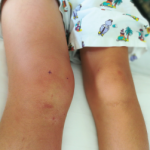CHICAGO (Reuters)—On May 13, U.S. health officials said they will issue an alert telling doctors to report cases of a rare life-threatening inflammatory syndrome associated with COVID-19 in children to their state and local health departments. The alert from the U.S. Centers for Disease Control and Prevention (CDC) will be released on Wednesday or Thursday,…
3 U.S. Children with COVID-19 Have Rare Inflammatory Syndrome
CHICAGO (Reuters)—Three U.S. children infected with the coronavirus are being treated for a rare inflammatory syndrome that appears similar to one that has raised concerns by doctors in Britain, Italy and Spain, a specialist treating the patients told Reuters. All three—who range in age from 6 months to 8 years—have undergone treatment at Columbia University…

Diagnosing Anti-MOG Autoimmune Encephalomyelitis
A case study of a 7-year-old girl who is eventually diagnosed with anti-MOG autoimmune encephalomyelitis highlights the necessity of a multi-disciplinary approach to inflammatory brain disease…
No Evidence to Support Biologic Switching Guidelines for JIA
NEW YORK (Reuters Health)—For young people with juvenile idiopathic arthritis (JIA) who don’t achieve disease control, switching to a different class of biologic is unlikely to be beneficial, researchers say. The observational study yielded no evidence to support or refute the 2015 National Health Service England guidelines, which recommend switching most patients to a second…

Pediatric Cases Require Special Considerations & Aggressive Treatment Plans
ATLANTA—Managing pediatric patients with rheumatic disease involves special considerations, such as developmental concerns and physiological traits that may affect dosing of medications, according to two experts. During a session at the 2019 ACR/ARP Annual Meeting, Courtney Kremer, ARNP, a pediatric nurse practitioner at the University of Iowa Stead Family Children’s Hospital, Iowa City, and Jessica…
Pediatric Rheumatology on Point: Explore Breakthroughs & Networking Opportunities at the 2019 ACR/ARP Annual Meeting
New in 2019, pediatric rheumatologists will be able to network in a community lounge, as well as attend the cutting-edge educational sessions specific to the field. Here’s a sneak peek…

Health Canada Approves Adalimumab for Chronic Non-Infectious Anterior Uveitis in Pediatric Patients
Health Canada has approved adalimumab for treating chronic non-infectious anterior uveitis in patients 2 years and older…

Arthralgias in Children: What to Do When Kids Present with Joint Pain
The evaluation of a child with arthralgia who has a normal physical examination provides a challenge to rheumatologists. Here are some insights into assessing and treating children with musculoskeletal pain syndromes…

Long-Term Canakinumab Treatment Has Favorable Effect on Systemic Features & Joint Health for sJIA
During a five-year trial of canakinumab, patients with systemic juvenile idiopathic arthritis taking canakinumab showed progress toward clinical remission and glucocorticoid tapering…

FDA Approves Subcutaneous Tocilizumab for Ages 2–17
The FDA has approved subcutaneous tocilizumab for treating active systemic juvenile idiopathic arthritis in pediatric patients as young as 2 years old…
- « Previous Page
- 1
- …
- 6
- 7
- 8
- 9
- 10
- …
- 14
- Next Page »